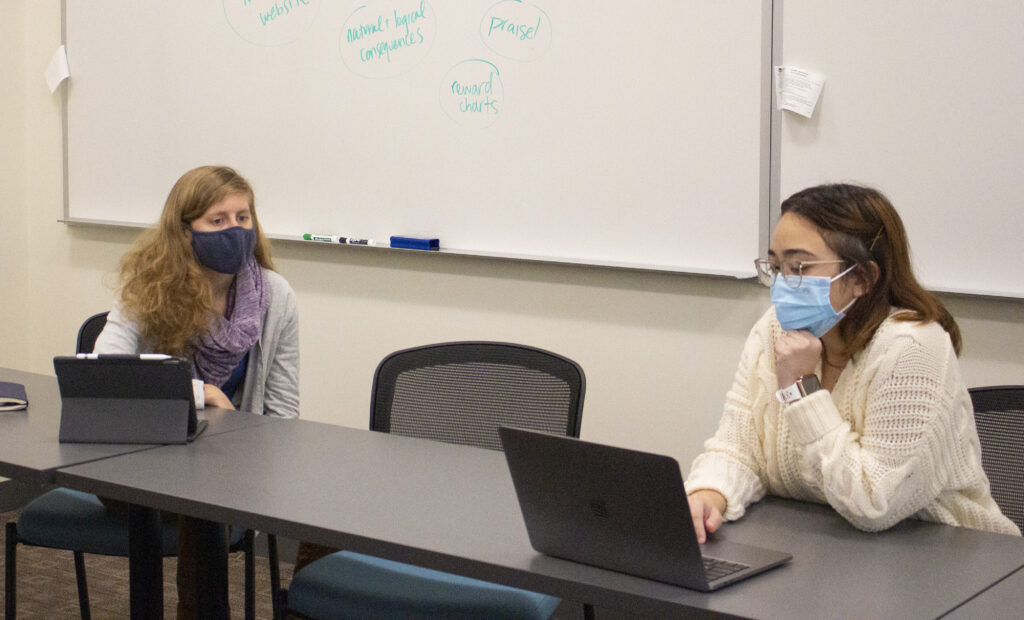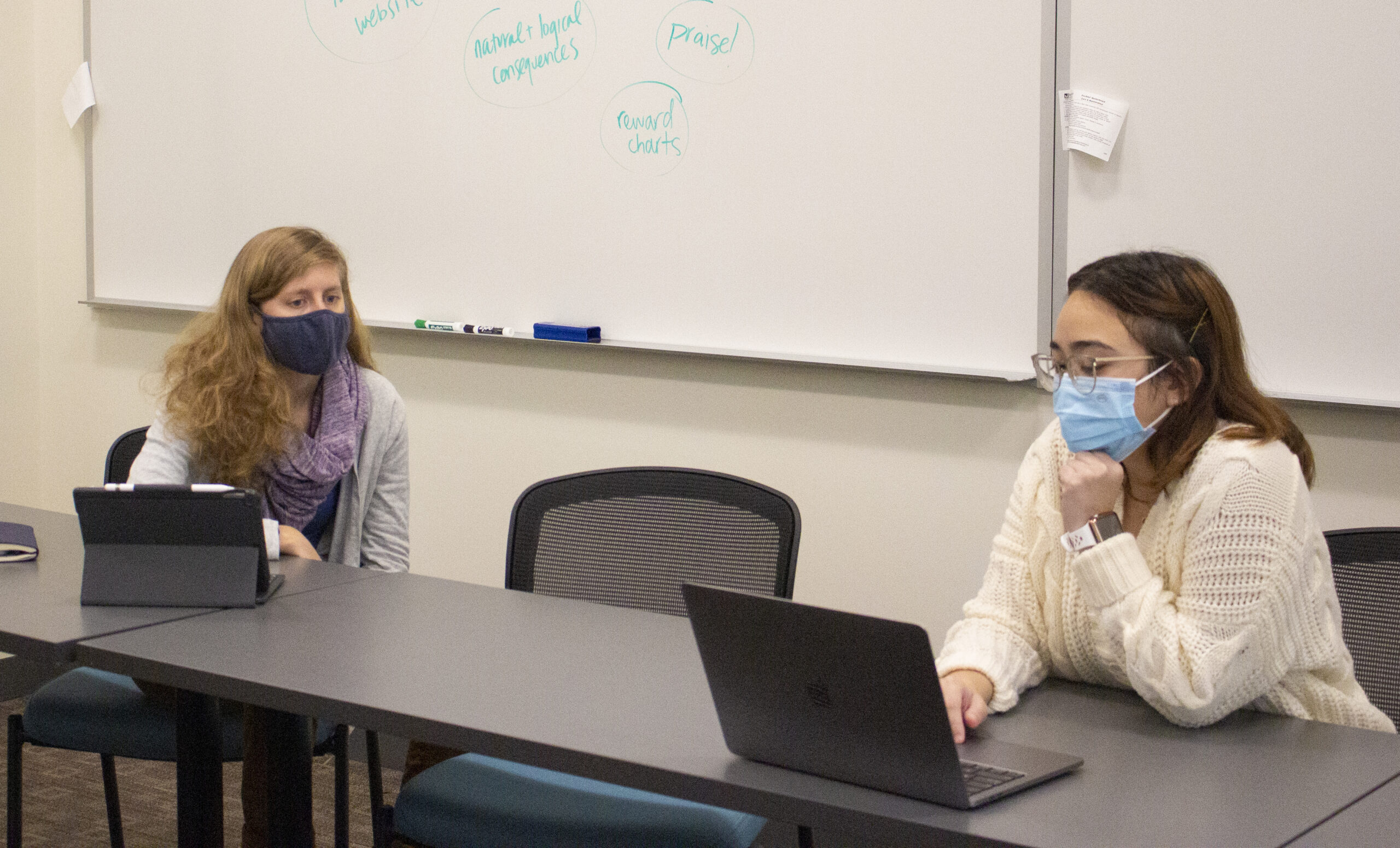
It’s been a year since Allegheny College established the Gateway Network, which builds partnerships between the college and businesses, government agencies, nonprofit organizations and other community entities and focuses not on the “problems” in the Crawford County community, but on the “assets” of the area to enhance their effectiveness.

Allegheny Professor Sarah Stanger, left, and student Suzaine Kyle Pador conduct research for the Gateway Network. (Photo by Derek Li)
To say the program has been a success is an understatement. In the fall 2020 semester, 66 students and 11 faculty members are involved in 14 community-based projects throughout Crawford County. The ongoing projects range from the Meadville YMCA Early Childhood Well-being Project to a Home Energy Audit Feasibility Study. Projects already completed include an Energy Utilization and Solar Energy Assessment at the Tamarack Wildlife Center and a Feasibility Study for a Community Museum of Science, Industry and Culture.
Allegheny faculty and students have long engaged in community- and project-based learning experiences that allow students to put their academic learning into practice. While these types of learning experiences are powerful and transformative for the students involved, they can be difficult to carry out given the limited timeframe of a semester or academic year.
“Recognizing some of the challenges associated with wider adoption of project-based learning across campus, a group of faculty, administrators, students and community partners began looking at models for establishing and sustaining these kinds of opportunities. Those meetings and discussions formed the basis for the development of a concept paper shared with a source that wishes to remain anonymous, and ultimately to a grant proposal funded in 2019 that established the Gateway Network,” said Terry Bensel, associate provost and director of the Allegheny Gateway.
Inspiration for the community-based learning projects comes from previous experience with programs such as the Community Wellness Initiative, the Bonner High Impact Initiative, the Network for Local Knowledge and Research, and the Year of Meadville, said Gateway Network Director Michael Williams.
So how does the Gateway Network differ from, say, the Bonner Program?
“There are multiple ways of partnering with the community, and the Bonner Program is a program that engages in what might be called ‘ongoing’ engagement that responds to steady needs that exist within the community, such as tutoring, mentoring, direct service with social service agencies and their clients,” Williams said. “The Gateway Network, on the other hand, is responding to specific questions or project requests that have a limited scope and a clear outcome. This is what is often referred to as community-based research, community-based learning or project-based learning.”
Gateway Network projects undertaken during the academic year are integrated into a student’s academic experience and are credit-bearing, while projects completed during the summer are paid and include students’ housing costs. A student might do a project through an independent study, a senior comprehensive project, an internship, a project within a course or through participation in a course that is designed around a community-based project.
The Gateway Network is rooted within a model referred to as “asset-based community development.”
“The goal is to move beyond a more traditional ‘deficit’ model that examines the community through a critical lens in an attempt to find ‘problems’ and to shift toward an embrace of the notion that our local and regional communities know what issues matter to them and to partner with them on their quest to develop community assets. So ours is a partnership model that works with our community partners to address challenges they face,” said Williams.
Sarah Stanger, assistant professor of psychology, and student Suzaine Kyle Pador have been collaborating on the Meadville YMCA Early Childhood Well-being Project. Most of the work is being done remotely this semester.
“I view this partnership as combining the Meadville YMCA’s expertise in early childhood education with our expertise in child clinical psychology and research methods,” said Stanger. “Currently, we are working together to conduct a needs assessment by surveying Meadville YMCA teachers and parents to identify avenues for bolstering the emotional and behavioral well-being of their children. My hope is for this collaborative effort to result in the implementation of specific evidence-based early childhood mental health prevention and intervention practices, such as a website of resources for parents, and workshops for parents and teachers, that meet the identified needs of the Meadville YMCA. We also see potential opportunities for future Allegheny student internships, in which students gain experience in the implementation of the evidence-based practices we’re putting in place through this Gateway Network project.”
Pador, a junior from Washington, D.C., commented: “The Gateway Network project has been the perfect opportunity for me to combine my interests in psychology and education because I love working with children and I have been eager to learn more about behavioral and educational development. I have enjoyed collaborating with the directors of the Meadville YMCA to make sure we are helping the children and families in the best way we can. I am learning so much from the research that I am doing on evidence-based practice in early childhood mental health, and I also appreciate that this project has provided me with professional experience in childcare which is a good opportunity for me.”
Ian Carbone, an assistant professor of environmental science & sustainability who is working with a student on the Home Energy Audit Feasibility Study, said, “I believe that this program could be a huge win-win-win for the College, the community and the environment. The idea is to create a platform for Allegheny students to carry out energy-efficiency work in the greater Meadville community. In this manner, homeowners will have access to services that will save them money; our community will burn fewer fossil fuels in order to meet our heat and electricity needs; and most importantly, our students will learn about the science and economics of home energy use. It is a wonderful learning experience for students because their work will have a real-world impact socially and environmentally.”
Besides continuing current projects into the spring 2021 semester, the Gateway Network will sponsor at least two new undertakings, said Williams. “We’ll be doing a major community health needs inventory for the Meadville Medical Center for the entirety of Crawford County. This will involve approximately 28 biology and global health studies students in the survey design and beginning stages of the implementation phase,” he said. “We’ll also be partnering with Pymatuning State Park to begin a comparative analysis of the breeding bird populations around the Pymatuning area. Next year (2021) will mark the 100th anniversary of the park, and we will be comparing current nesting bird populations with two historical studies conducted in and around the park, in 1928 and 1948.”


